Tejumade Adefioye-Dairo: Social media helps me reach my target market
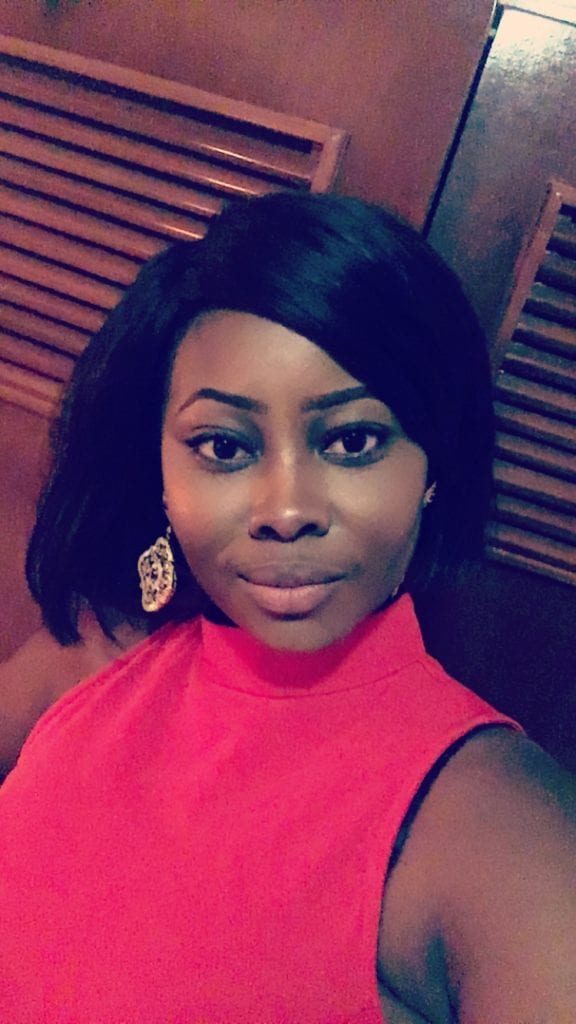
[bctt tweet=”Lazy sellers online are often competitive – Tejumade Adefioye-Dairo” username=”SheLeadsAfrica”] Tejumade Adefioye-Dairo is a graduate of Industrial Chemistry from Bowen University, Nigeria. She is also the founder of Haute Global company. Her brand, Haute Signatures specializes in the sale of handbags, shoes, jewelry, and sunglasses. When Tejumola is not thinking about new bag designs, she is looking for the next best fashion deals for her clients online. In this interview, she shares here growth from personal shopper to #MotherlandMogul and how she has used social media to grow her brand. What inspired you to start your brand? I started as a personal shopper but I got tired of traveling as a personal shopper. Also, I wanted to start a brand for Nigerians and sell at the same price or even more affordable than other international stores. How have you used social media to grow your brand’s publicity? I have profiles/pages on Instagram, Facebook, and Twitter. I put more concentration on Instagram because it gives me the opportunity to reach a larger audience and my target market is mainly on Instagram. [bctt tweet=”I have faced several challenges promoting my brand online- Tejumade Adefioye-Dairo” username=”SheLeadsAfrica”] What are some of the challenges you have faced online while trying to promote your brand? I have faced quite a number of challenges but the three biggest ones have been; Trust – Lots of Nigerians have been scammed online so they find it difficult to pay for items they have not seen. Competition from lazy people who just steal your pictures, brand it as theirs and try to rip off innocent people or buy from us and sell at ridiculous prices. Logistics problem in Nigeria. Fast delivery comes really expensive and people won’t want to buy a product of 500-5000 and have to pay as high as 2000 for delivery. Describe your product retail stages. How does your product move from your store to the final consumer after an online purchase? First, I think of and imagine a design, then I contact my manufacturer and we agree on a price. They produce the items and ship them to me. The last stage is marketing and sales. Which social media platform has been a better contribution to your sales? Instagram Are you satisfied with the current progress of your social media channels? Give reasons for your answer. No. There are still much more people who need to know of our brand. What advice would you give to someone who is intending to begin a social media business? Calm down and please keep investing your profit. If you’d like to share your story with She Leads Africa, let us know more about you and your story here.
Isioma Onyegikei: Social media has helped reach our target audience

[bctt tweet=”It has not been so difficult to sell food online – Isioma Onyegikei” username=”SheLeadsAfrica”] 24-year-old Isioma Onyegikei is the founder and head cook at Brelunds, a food service provider startup in Lagos, Nigeria. Her startup offers services which include the running of office cafeterias, breakfast, and lunch weekly subscription plans, events catering, bulk soup and stew preparation. Isioma officially began Brelunds in September 2015 with a standard menu consisting of Nigerian dishes, finger foods, and Nigerian street foods. She is a graduate of Political science and public administration from the University of Benin, Nigeria. What inspired your decision to start a food retail business? The decision to start a food retail business was inspired by my experience as an employee for another company. I resumed work very early and got home very late due to heavy traffic in the city. Saturdays were the only days I rested, did chores and caught up with friends. On Sundays, I go to church and prepare ahead for the next week. I realized that it was the reality of most of my colleagues. Some even had to work on weekends too. Cooking is a huge chore because time and rest in Lagos is a luxury to a typical Lagosian. So I started out by making and delivering bowls of soup and stew. My intention was to ease my client of cooking as a chore, an important human need. Along the line, the idea of a weekly lunch plan to be delivered to clients at work came up. How have you been able to sell cooked food to people via an online medium? Describe the process from order to sales. For now, we sell our meals online via our Twitter and Instagram pages. We are currently working on a better website. We post information about our services on these platforms; potential clients see our information online and contact us for the service they want. They either pre-order for bowls of soup/stews or they subscribe for any of our lunch packages. They provide us with their names, phone number(s) and address for delivery. It has not been so difficult selling cooked food online because it is an important need and a food delivery business helps the client with one less problem to worry about. [bctt tweet=”Social Media has helped with referrals – Isioma Onyegikei” username=”SheLeadsAfrica”] How has social media enabled you to reach your target audience? Frankly, social media has enabled us to reach our target audience in the sense that a lot of young Nigerians (Lagosians) and even older Nigerians are online. The chances that our next client that we will market to offline has a Twitter, Facebook or Instagram account is 80%, so with social media, it is easy to market to a lot of people at the same time in different locations with just one post. Potential clients also come online to search for a service they need, we see this and market our service to them. Social media also has helped in terms of referrals. An old client can see someone asking for a similar service and refer them to our page. Instagram, for example, is pictorial so with a business page, anyone who comes across the page already knows what services to contact us for. The use of hashtags has helped in getting across to our intended target audience because people do search for the service thy want using related hashtags. Which social media channel do you consider to be the most responsive channel for your business? Twitter has been responsive and this is because people do not necessarily have to follow you to see your tweet on their timeline. Retweets are free. There is also the advantage of having others try out a service that one or two of their friends have used and Twitter seems to be the most engaging social network to set up that way. How often do you make sales from social media? We make sales from social media regularly. It is a food business and now, more than ever, people desire convenience. Also, the fact that we have two different service offerings: pre-ordered bowls of soups/stew and lunch subscriptions, helps to ensure that we are able to reach a broader segment of people and meet more needs. [bctt tweet=”Logistics is an issue for online businesses. – Isioma Onyegikei” username=”SheLeadsAfrica”] What are some of the issues you have faced while trying to run your business online? In running an online business, our main issue has been logistics. First of all, we run a value for money service, delivering high-quality meals at very affordable prices. Currently, a lot of logistics companies charge very high for their service and most times it makes no sense to ask a client to pay more for delivery than the actual food they are buying. Also, the logistics companies have other clients that they also trying to service while servicing you. In situations like this, it is very easy to get disappointed at any time or have a client’s order messed up on the way. There is also the issue of bad publicity when running an online business. Social media can make or mar business. An unsatisfied client can easily discourage others, totally within their rights, so for us at Brelunds we ensure that our customer service is top notch and intended to “wow” both clients and potential clients. What’s your perfect one-line statement for young females trying to build a brand via social media? Know what you do, learn what you don’t know and know those who know what you don’t know. If you’d like to share your story with She Leads Africa, let us know more about you and your story here.
Adebimpe Akinbuja: Producing safe chickens for consumption
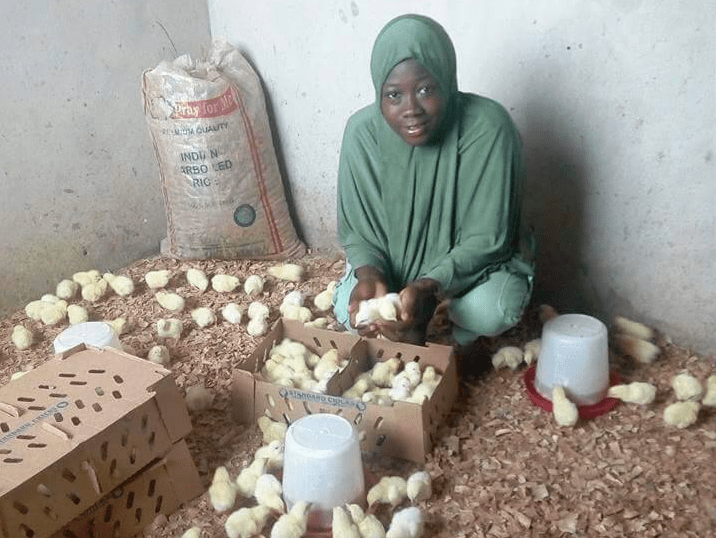
[bctt tweet=”I made up my mind to create employment for myself & grow it so that others will have jobs too” via=”no”] To ace our hustles, we need to be alive and in good health otherwise, we won’t be able to make the impact we desire. This is why we need to eat good food, quality food that will not impede our health in any way. This young woman, Adebimpe Oladunjoye Akinbuja is doing something about the quality of chicken available for consumption. She studied animal production and health at Ladoke Akintola University of Technology ( LAUTECH) and is putting this into her hustle. It’s no wonder that when she saw the challenges in the sector, Adebimpe decided to change the narrative in her own way. How did you find yourself in the poultry business? At first, it was simply because I saw the alarming rate of unemployment in the country. My senior colleagues were graduating but were not having something tangible to do for over a year. I made up my mind to create employment for myself and grow it so that people around me will have a job out of it too. After creation, I discovered there was more to do. My landlord in school then operated a cold room. One day he told us about how we are gradually dying from the things we eat. He told us that the frozen foods we eat are being preserved using an embalming chemical, formalin. He spoke as if we didn’t have a choice but to keep consuming this ‘dead-body fluid’ (in pidgin accent) and continue to die gradually. I took that information a little further and decided to produce chickens that will be safe and healthy for the consumption of humans. That is amazing! What are the challenges in this business line? I’ve had to face challenges from technical, to financial, to environmental, market, transportation and the major one has been power. And I’m still facing some of them till date. There is perception that the Poultry business is too risky, what is your opinion? People say they hate poultry business because chickens die a lot. They believe it is a risky business. Yes, poultry business is highly risky and chickens die but every business has risks, what should be focused on is risk mitigation. With a good business model, appropriate poultry house, good biosecurity practice, a learning mind and God’s blessings you will be a successful poultry farmer. [bctt tweet=”The poultry business is highly risky but every business has risks, rather focus on risk mitigation” via=”no”] What other opportunities abound asides rearing the chickens? Poultry business is filled with lots of opportunities. We have egg production, meat production, live chicken production, transportation, poultry housing and equipment, processing and marketing, training and consultancy. Do you think the Nigerian system is favourable to this line of business? I would say no because in Nigeria, we still struggle with the problem of power and this is eating into the profit of farmers. We also have issues of hatcheries not been transparent enough. And importation of frozen chickens still affects the sales of fresh chicken in Nigeria. [bctt tweet=”In Nigeria, we still struggle with power cuts and this is eating into the profit of farmers” username=”SheLeadsAfrica”] What is your advice to young women interested in building a poultry business? Learn. Find yourself a coach and a mentor and let them show you the way. Ask questions and network with other poultry “agripreneurs”. If you’d like to share your story with She Leads Africa, let us know more about you and your story here.
Cynthia Okuwashaka: Everyone has a talent inherent they can work on

[bctt tweet=”I try as much as possible to come with something new to make myself stand out” username=”SheLeadsAfrica”] Cynthia Okwuashaka craving her own financial independence started out as an apprentice in a nail studio. Thereafter, she went on to acquire training in hair making and makeup artistry. All these skills she acquired while studying the English Language in University. A few years later, she enrolled at the Opral Benson beauty school and has now become a certified massage therapist. Cynthia worked in several beauty lounges and finally at Four Points before resigning to start her own business Spaquil Beauty Therapy, a mobile spa, and wellness business in November 2015. Since then, she hasn’t looked back. For Cynthia, she finds peace and fulfillment when she is able to help her clients get relief from aches they feel before the session. In addition, earning her own income in a decent way brings even more fulfillment. How did you come about the knowledge that you could self-sponsor yourself through the university rather than be financially dependent on anyone? I had the opportunity of meeting a friend’s sister who told me she supported herself through school fixing false nails. So I said to myself if she could do it so I can. That’s how I started working at a nail studio and went on to learn hair making too. Why did you leave your job at Four Points to start your own business? Four Points for me was a phase I knew from the onset will pass so when the time came, I had to leave. I have always pictured myself as my own boss and my years there were to gain experience so when it’s time for me to setup mine I will do it and be successful at it. [bctt tweet=”…there’s so much fulfillment in making your own money in a decent way” username=”SheLeadsAfrica”] How do you manage competition in your business? Knowledge they say is power, I try as much as possible to come up with something new to make myself stand out. You are a graduate of English language, how does your discipline impact your business? In the area of communication, my discipline has given me an edge as people see therapists as secondary school drop outs. When I have a conversation with my clients, they get to see a different side of me. Sometimes, they then ask why I had to settle for a therapist instead of working in line with what I studied in school. I tell them I have a passion for therapy. [bctt tweet=”I know for sure one step at a time gets me closer to my goal.” username=”SheLeadsAfrica”] What plans do you have for the future? Like I said, knowledge is power so am working very hard to get more training in my field of practice. What is your advice for girls from indigent homes who feel they can only survive by being financially dependent on men? Where do they start from? First of all, they will need to make a decision about the kind of life they want and work towards it. Dependency cripples, and there’s so much fulfillment in making your own money in a decent way. Crafts pay off in the long run and everyone has a talent inherent they can work on and pray as well for God to bless and prosper. The journey of starting one’s own business and growing it is a very tough one, where do you get the inspiration to continue in down times? I would say my passion for massage therapy is what keeps me going, Spaquil Beauty Therapy was birthed in November 2015 and I have had the opportunity of traveling to South Africa for training in less than 2 years of starting up. And when I think of the difference I can make in the lives of people with my healing touch I keep going no matter what. I know for sure one step at a time gets me closer to my goal. You moved from making hair and being a nail technician to a makeup artist and now a massage therapist. It seems you have worked longer as a massage therapist. Is it that you are passionate about this than the other trades and why? Massage for me is my sole calling in life, it goes beyond touch, I find peace and fulfillment when am able to help my clients get relieved of aches they feel before the session. I see myself as a small doctor (lol). How do your parents feel about your accomplishments so far being a certified therapist and running a successful business at 29? My parents have always given me support. In fact, my father who is very educationally inclined actually gave me the go ahead to learn vocational skills while I was still at the university. Today, they are happy and proud of me which is the joy of every parent to see their child or children succeed in life. If you’d like to share your story with She Leads Africa, let us know more about you and your story here.
Dr Kel: The Healthertainer
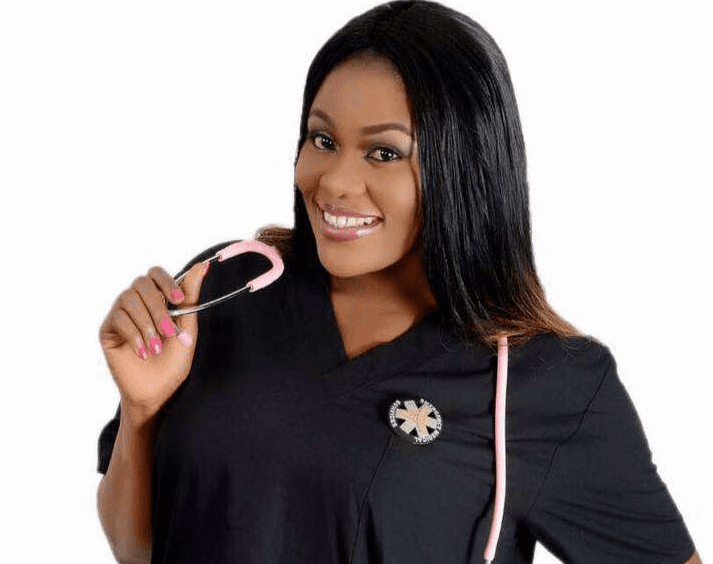
[bctt tweet=”I can proudly say that the word ‘healthertainer’ is from me – Dr. Kel @Healthertainer ” username=”SheLeadsAfrica”] If you do not know Dr. Kel on social media, I really wonder where you have been. She is the vibrant young lady who provides medical information in a fun and catchy way on Instagram, Twitter and Facebook. SLA contributor Ugochi got talking with her and she shared about her journey. Dr. Kel bagged her M.B.B.S Degree from Imo State University in 2014, did her Internship Program at 445, Nigerian Airforce Hospital, Ikeja Lagos and served at the Government House Clinic, Lokoja, Kogi state. And of course, she was retained there after the completion of her NYSC. Who wouldn’t retain such a bundle of talents? Let’s meet her! How did you evolve to be this social media phenomenon? I had always had a flair for entertainment and social media and I got involved in a few entertainment activities while in school. I was always active on social media ( HI5, Facebook, Myspace, Tagged, Keek) and it was all for fun until medical school got really serious and I had to disappear for a while. After I graduated, I had more time for the internet but this time I didn’t want it to be just for fun, I wanted to educate people on basic health issues, add more value and impact lives with my social media presence. I thought about starting a health platform where I would teach health and health related topics but I wanted to do something different from the norm. This meant health information delivery in the most entertaining and relatable fashion possible and this birthed the word: Healthertainer, a perfect blend of health and entertainment. I can proudly say that the first mention of the word “Healthertainer” on the digital media space was from me. [bctt tweet=”I didn’t want social media to be just for fun, I wanted to educate people on basic health issues” via=”no”] Asides being a doctor, what else do you do? (Chuckles) Please don’t call me Jack of all trades after I am done with this question. Lol. I have a registered start-up company which is a consulting agency that offers services to non-governmental organizations and organizations alike. We organize themed events, creating concepts and originating ideas for these events as well as supervising/implementing them. Serving in Kogi State provided a fertile platform for my startup to thrive. During my service year, I handled a couple of successful projects which were really innovative and outstanding in the state. “The Preemie Walk & Talk” for Tiny Beating Hearts Initiative, to celebrate World Prematurity Day, “Governor Yahaya Bello Walk For Peace” for Youths For Peace And Security Nigeria, to celebrate the 365 Days in Office of the Executive Governor of Kogi State “Annual Medical Outreach” for Ogori Grand Progressives Initiative, to celebrate the Ovia Osese Festival in Ogori Community, Kogi State The above is my offline hustle. On social media, I have another “workshop”. I am a Digital Media Strategist and a Social Media Influencer. I focus mainly on Medico-Social issues and trending topics which appeal to my target audience and I turn it into educational viral content which I push from my social media platforms. I have quite a robust platform with over 36,000 followers on Instagram, over 8,000 on Twitter who are interested in Health. I ride on these platforms to further promote my clients’ products and services. [bctt tweet=”It’s not an easy endeavour combining medicine and other side hustles @Healthertainer” username=”SheLeadsAfrica”] How do you manage all the causes you’re involved with, work and your health platform? Truth be told it’s not an easy endeavour combining Medicine and other side “hustles”. Nonetheless the key elements of determination and focus have helped me achieve the height I am at the moment and keeps driving me towards the future. My primary focus is on my clinic duties (for now, until I blow, lol). In between seeing patients, I find time to work on my proposals, clients orders, concept generation, idea expansions and content for my page. It is all about “balance”. I remember when I was working on my first CSR Project – #HepFreeZone last year. I somehow managed to find time to solicit for funds, plan and carry the event whilst doing my 9am – 6pm routine. Phew! Same with the projects I carried out for my clients and the outcome for each of these projects were commendable, I must add. I am currently working on another project which will kick off any moment from now, and I know I’ll have to work my magic somehow to find time in between work or after work to do all the necessary things. You seem to run all these smoothly? “Smoothly,” you say? Wow. I take that as a compliment because most times I am all over the place and forgetting somethings I should have gotten done or neglecting some others. “Smoothly” isn’t quite the word, but somehow I manage to get it all done eventually. I sit back after each feat and I wonder how I pulled it off. Truth be told it’s not an easy endeavour combining medicine and other side “pieces”, but we have to try. Let’s talk about social media, how important is it to business today? Oh yes! Social media has its perks. It is an effective tool for business as it helps you grow an audience and prospective clients. However, every entrepreneur has to be wary of “false impressions”. You need to target your audience and reach prospective clients/consumers. Sometimes it is not about the number of followers you have, but the quality of followers. Make sure you are reaching out to the right people. Not just the “spectators” and “consumers” but also the investors and prospective clients. Social media has given me a lot of exposure. People can easily follow my works and share them thereby expanding my network of followers. Social media has also provided me a cheaper and
Bessie Duke-Odu: The Flair Hair Academy was born out of my refusal to rest on my oars
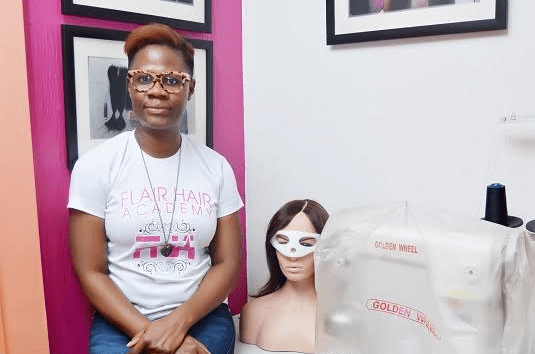
[bctt tweet=”Africa has come of age and needs to get industrialized hence sharing my expertise through the Academy” via=”no”] Bessie Duke-Odu is the Proprietress and Lead Posticheur at Flair Hair Academy (Nigeria’s foremost Human Hair Academy). With a degree in Microbiology, she started off merchandising human hair and hair accessories and in 2010. The Bessie consciously decided to delve further into the research, manufacturing procedures and processes of human hair. She is Korean-trained by the renowned John Korea Hair School in South Korea. Bessie has also acquired degrees from various institutions in Germany, the United States, China and the United Kingdom. Bessie Duke-Odu is also a World Bank Scholar, an alumna of the prestigious Enterprise Development Centre (PAN-ATLANTIC UNIVERSITY), a professional member of the Complementary Therapist Association (UK) and is listed in the Embody Magazine UK as a qualified service provider. Can you tell us what most people don’t know about you? Hmm…that’s a broad one. Over the top of my head, I’d say my tenacity. I rarely give up on things or people. I’d rather buy furniture from IKEA where I can lay the manual out flat, assemble the bolts and every other fitting accessory and work my way to the finished look. You have a degree in Microbiology, why did you go into merchandising human hair and hair accessories? Now, that sounds like two extremes but I guess I naturally flowed to my inherent side. As early as when I was 8-9 years old, I could weave hair and I picked that up by just watching. At the time when I started merchandising, running the hair and accessories enterprise gave me the ample time to tend my new baby and adjust to motherhood without the pressures of a paid 9-5 whilst still being economically viable. What lead you to start Flair Hair Academy? Flair Hair Academy was born out of my refusal to rest on my oars, challenging status quo as it were. Essentially with the knowledge acquired over time, floating a range of wholly made in Nigeria hairline would’ve been exclusive to me. But Africa has come of age and needs to get industrialized hence sharing my expertise through the Academy. What’s one thing about your industry that you didn’t expect before getting into it? As the progenitor in this, it has its first mover advantages as well as disadvantages. Acquiring knowledge has been hugely capital intensive. Nonetheless, every accomplishment begins with the decision to try as successful self-actualization lies just outside your comfort zone. [bctt tweet=”Every accomplishment begins with the decision to try – Bessie Duke-Odu” username=”SheLeadsAfrica”] You’ve been trained in South Korea, China, Germany, and the United States, can you tell us a bit about that and why you decided to choose these countries? Absolutely, I realize that knowledge is power but it takes my enthusiasm to keep pulling that switch. From my research, I discovered that Korea played a huge role during the early years of world industrialization especially after wig making moved to the East. All the named countries have what is unique to them and I am glad to give enrollees a good mix. As an ardent learner, I never restrict my self-development to capital or anything else. I would rather trade in my phone or other paraphernalia to learn a new skill than to walk around with all of that unskilled. I also recognize that going to YouTube to feed off all sorts is an option but I made a conscious and informed decision to research and invest; knowing that a small amount of knowledge can mislead people into thinking that they are more expert than they really are. [bctt tweet=”I’d trade in my phone to learn a new skill than to walk around with all of that unskilled” via=”no”] What kinds of services do you offer? Our bailiwick is in training, handing down well-researched hair manufacturing skills to people who value their development. We train people on how to set up mini hair factories, improve existing salon services, upscale human hair businesses from just buying and selling to production capacity thus reducing to the barest minimum importation on finished hair goods into the country/continent. We also offer contract manufacturing to hair vendors. Our courses include Machine Wefting, Wig Making, Human Hair Texturing, Hackling, Wig posting, Preparation of raw hair, Handtied Wefting, Human Hair Processing and Human Hair dyeing. We have an upcoming Wig Making Workshop this July and enrollees will learn the history of Postiche, how to ventilate a closure, frontal, full wigs, create templates, lace repairs and so on, all from scratch. We help them develop their value proposition and build a sustainable business model canvas. At Flair Hair Acamedy, we have had enrollees from Cameroon, Kenya and within Nigeria. Practically anyone (novice or hair guru) can go through our training and learn the ropes effectively. What do you think makes Flair Hair Academy different from others? Simply put, our resolve for greatness and constantly outdoing ourselves. What movie did you watch recently that stood out to you? Aww…. Definitely “Me Before You”. I teared up and got very emotional. It is a must watch. Look for it! Sponsored post
Facebook Live with Jamila Lawal: Starting a talk show to tackle social issues (July 26).

When it comes to tackling social and economic issues, starting a talk show and getting your voice on air could be the way to go. Did we hear you say talk shows are only for people in the media? It doesn’t matter what your career is, or your major source of income, if you know how to use social media to your advantage, then you can also start your own talk show or TV series. Join us for a Facebook Live on Wednesday, July, 26th, with Jamila Lawal, a nutritionist, culinary expert, and the producer and host of the TV series, Mila’s Diaries. She’ll be sharing with us how talk shows are so not outdated, and what it takes to start your own talk show. Jamila started her talk show, Mila’s Diaries to be of service to the economically disadvantaged and address issues affecting northern Nigeria such as divorce, child abandonment, early marriage, education etc. She also uses this medium to showcase success stories of the people within the region. [bctt tweet=”Jamila Lawal wants to teach you how to start your own talk show. Facebook Live( July 26)” username=”SheLeadsAfrica”] Register below for this session and ask Jamila any questions you might have on this topic. Some of the topics we’ll cover Why TV and talk shows are not yet outdated Best approaches to addressing social and economic problems What it takes to start a talk show Tackling the issue of divorce in Nigeria Facebook Live Details: Date: Wednesday, July 26th Time: Lagos 5pm // Joburg 6pm // Nairobi 7pm Where: facebook.com/sheleadsafrica/ Watch here: https://www.facebook.com/sheleadsafrica/videos/1917891998434111/ About Jamila Jamila Lawal is a qualified Biochemist with advanced degrees in nutrition. She was recently on the Maggi Ramadan campaign trail offering nutrition advice to women in different communities. She advocates living a balanced and healthy lifestyle in fun and exciting ways without compromising the enjoyment and quality of meals, culture, and most of all your relationship with God. Jamila considers herself progressively multi-lingual with current fluency in English, French, Arabic, Ebira, Hausa and with a more than average understanding of Yoruba. Her TV Show, “Mila’s Diaries” debuted recently and it encapsulates all her interests and the values that she holds dear to heart. Jamila loves music and flowers. When she isn’t trying out new recipes, you can catch her baking cupcakes with her 6-year-old son.
Omowunmi Kolawole: Social media is my only marketing channel
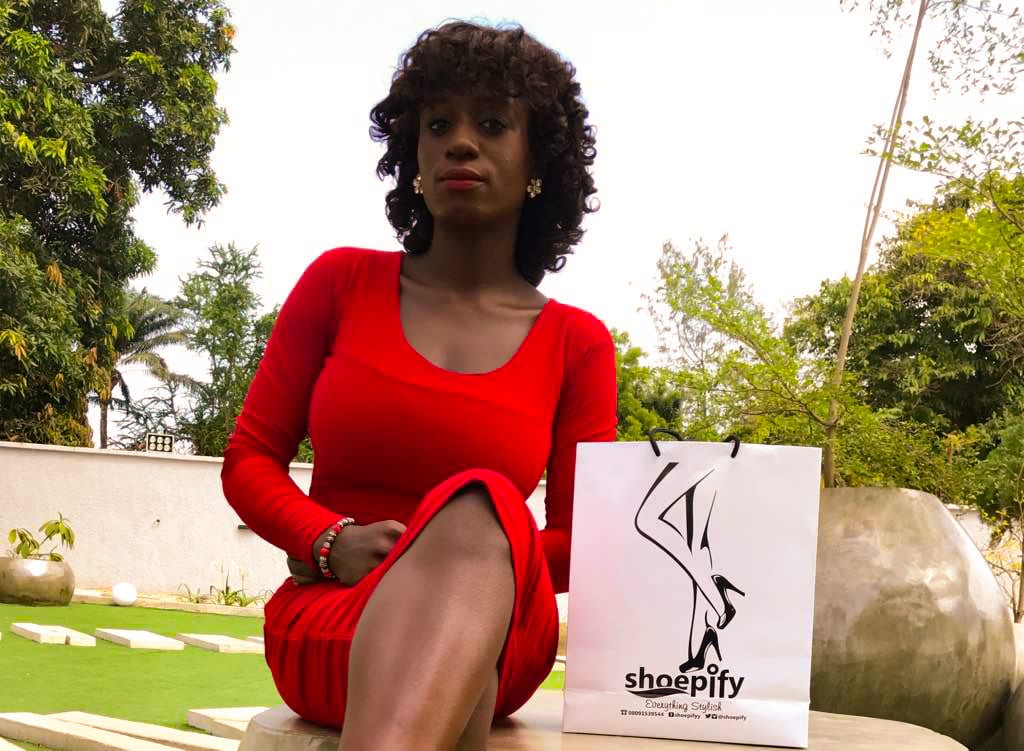
[bctt tweet=”I make more sales via Twitter than other social media networks- Omowunmi Kolawole” username=”SheLeadsAfrica”] Omowunmi Kolawole is a 26-year-old graduate of Political Science from the University of Lagos. In September 2016, she founded Shoepify, a shoe brand targeted at women who are all about winning in the financial world while looking amazing and saving money at the same time. The brand is dedicated to the smart spenders who can totally “slay” without breaking the bank. Apart from selling shoes, Omowunmi is a trained fashion designer who is on her way to launching the next best brand in the Nigeria’s fashion industry. Why did you choose to sell shoes? Two major factors triggered this. The first is my target audience. I target people with big feet; these are people who find it difficult to get their shoe sizes. This is a major challenge because I can personally relate. Most of the sizes we stock are 39 upwards. Although we are looking to stock more of 37, 38 and 43 as we have had increasing demands for them. The second factor was based on a research I did. I found out there was a gap in the online shoe business. Vendors often cater more to high-end customers. People weren’t really selling shoes below N12,000 (~$37) so it was an opportunity for me as there was a market suffering. We don’t stock shoes above N10,000 for now. Is social media your only channel of marketing? Yes, it definitely is. Apart from the word-of-mouth marketing, I do at various gatherings, I channel all other marketing into social media. What are your primary social media channels and how long have you been using them? Twitter and Instagram. We started using them September 2016 but went full scale in March 2017. What social media platform do you consider more productive in terms of audience and sales? Sometimes it shifts, but I have definitely made more sales on Twitter. I personally use the platform a lot, so I have been able to capitalize on my personal profile. Customers are also more engaging via Twitter. Retweets go a long way in helping the business as it can land on thousands of people’s timelines. Twitter has definitely been more productive. [bctt tweet=”People find it hard to trust brands on social media- Omowunmi Kolawole” username=”SheLeadsAfrica”] What are some of the challenges you have faced while using social media? With social media, you have to be constantly online to engage potential buyers. You need to keep them engaged and the platforms are quite different. What works for Twitter may not work for Instagram thereby, making you create double content around the same picture/post to get reactions. Another challenge is trust. I found out there are a lot of illegitimate businesses running online especially on Instagram so people find it hard to trust brands. Clients are skeptical about paying their money to someone they don’t know or not getting the exact item they paid for as shown in pictures. So we have to go the extra mile to convince them. How has social media affected your general sales? About 90% of the sales have come from social media so I can say that even though there are challenges, we are pushing through and it is definitely getting better. People are beginning to trust the brand more. [bctt tweet=”Do a research before using social media for marketing- Omowunmi Kolawole” username=”SheLeadsAfrica”] Which one-sentence advice would you give to someone interested in using social media as their marketing force? Do your research, know what your target market wants and give them. f you’d like to share your story with She Leads Africa, let us know more about you and your story here.
Ginika Okafor: I wanted to create colourful products that are uplifting in every way

[bctt tweet=”Being an entrepreneur is no child’s play in Lagos – Ginika Okafor, founder Yili Footwear ” username=”SheLeadsAfrica”] Ginika Okafor is a lawyer, art lover and a Motherland Mogul showing that young Nigerians can wear #MadeinNigeria with pride. In between trying new foods, visiting new countries and experiencing their culture, Ginika designs and creates footwear. Her brand Yili is fun, colourful and Nigerian-made. Ginika is secretly an adrenalin junkie, so you may catch her either bungee jumping or sky diving (but just make sure her dad doesn’t read this). Here she shares with us the challenges of sourcing local materials in Nigeria and sums up what it means to be an entrepreneur in Lagos in three words. Why did you decide to start Yili? I love colours. I like to be surrounded by bursts of colours and as a result I infuse a lot of colours in my everyday outfits and surroundings. With this in mind, I started Yili because I wanted Nigerian-made and sourced footwear, which infuses bursts of colours in its aesthetics. Furthermore, I notice colours have positive effects on moods and I wanted to create colourful products that are uplifting in every way. This is why you find most of Yili slippers are combinations of different bright colours. Also, there is an option for customers to choose the particular materials and colours that will go with our existing designs. This makes each footwear more personal, unique and more meaningful to each customer. How have you (or do you) overcome challenges that your business faces? One of the many obstacles I faced so far is the sourcing for materials locally. We get our leather from the local markets, and what is available this week may be sold out the next. I overcome this struggle by widening my local contacts. This means I travel across Nigeria in search of good local manufacturers selling quality materials. This also affords me the opportunity to see different parts of country and to better understand the culture and everyday living experience of many Nigerians. Also, due to the exchange rate crisis, the prices of a lot of our raw materials have increased in price thereby forcing us to increase our prices. In this forex instance, I can’t really do much but hope the price of forex comes down. All in all, I have learnt to continue to push through in spite of various obstacles. #andyetshepersisted. [bctt tweet=”Sourcing for local materials have taken Ginika Okafor to very interesting parts of Nigeria ” via=”no”] Can you share the process of sourcing for materials as a 100% made in Nigeria brand? Our products contain different materials from leather to adire to calico etc. What many people don’t know is different parts of the country specialise in different goods/material. Take ake adire for instance. The best adires are found in Abeokuta. So, when I’m buying my adire I don’t buy it Lagos; I travel to Abeokuta, speak with different families and vendors that have produced adire for decades. I learn from them on what is new, how they come up with new designs and so on. This applies to all the materials we use. Sourcing for local materials have taken me to very, very interesting parts of Nigeria and I hope to tell the different but amazing stories in a memoir one day. Where do you see Yili in the next two years? Expanding. This expansion includes opening a local manufacturing plant, having our own standalone stores in in Lagos, Abuja, Port Harcourt and Kano as well as in three African countries. We would like to partner with various independent retailers to stock our products. However, we want to ensure that whichever store we stock in must understand the ethos and vision of the brand. Also, we want customers to be able to order Yilifootwear from our website and have it delivered anywhere in the world. What do you think is necessary to take Yili to the next level? We need funding. Expanding the business requires a lot of money we don’t have now even though we are open to investors. Also, we believe having a e-commerce website will not only give the brand the visibility it need but it will improve accessibility too. We are currently working on our website, once that is up and running anyone can order Yilifootwear and we be shipped worldwide, thereby expanding the brand presence globally. What’s your favourite Yili footwear design? The Max slippers because I named it after my eldest sister who has been a huge support and inspiration in my life. #loveyouMaks What three words describe being a young female entrepreneur in Lagos today? Being an entrepreneur is no child’s play in Lagos. It is a wilderness out here and every day is the survival of the fittest. That said, being an entrepreneur (especially a female entrepreneur) can be described thusly Perseverance Hardworking Hopeful If you’d like to share your story with She Leads Africa, let us know more about you and your story here.
Being your own boss as a freelancer

[bctt tweet=”You need to fully get your hustle on and sell yourself whenever you get the chance.” via=”no”] Welcome to the freelance life. First off, I’ve noticed a Nigerian trend where too many young people are obsessed with the title of CEO on their name cards, and less committed to undertaking the hard work that comes with working for oneself. In an economy that may or may not be in a recession, the conventional employment sector is overburdened as too many people clamor for scarce resources. For some others, the strings of a 9-to-5 or round-the-clock job working for someone else is just not appealing. Let’s be straight up, here. Freelancing is not an easy path to navigate but there are serious perks to it if you’re actually good at what you do, and if you’re prepared to put yourself out there. There is such a wide range of freelance occupations which includes writers, graphic designers, animators, accountants, MUAs, hair stylists, recruiters, lawyers, models, real estate agents and more. Statistics tell us that about a third of all working Americans are freelancers. In several parts of Africa, we can expect that more people are also taking up freelance work. There are several perks to working as a freelancer: Your time is flexible You’re your own boss You get to select the projects that interest you All that sounds super great, so let’s balance it out. There is a downside…there is no guaranteed income stream. This is true especially when you’re just starting out. It means you need to fully get your hustle on and sell, sell, sell yourself whenever you get the chance. Some periods may be a lot better than others. Sometimes, you’re absolutely swamped with work and at other times, you’re almost begging for work. How to boss it? Network! Whenever you meet new people or talk to old friends, tell them about what you do. People are always looking for freelancers but you wouldn’t know if you don’t spark up the conversation. Be super organized It’s important to respond to clients in a timely manner and to keep adequate records. It helps to have a to-do list and to set hours when you must get things done. Brand yourself online and offline Use social media to showcase your skills and highlight your personal brand. Work on a splendid offline portfolio too, get all your marketing tools in check. Look for opportunities on social media Forget looking only at the traditional sources! I personally have been exposed to more opportunities on social media. Twitter is a great tool to find work and engage with other freelancers as yourself. I personally love the freedom that comes with being able to plan around my own time, to travel while I work, to work at odd hours. Just remember, you need to be practical about your goals and expectations, and you need to put considerable time and effort in to get to your ideal place. Kindly share your tips and experiences from working as a freelancer with us.
